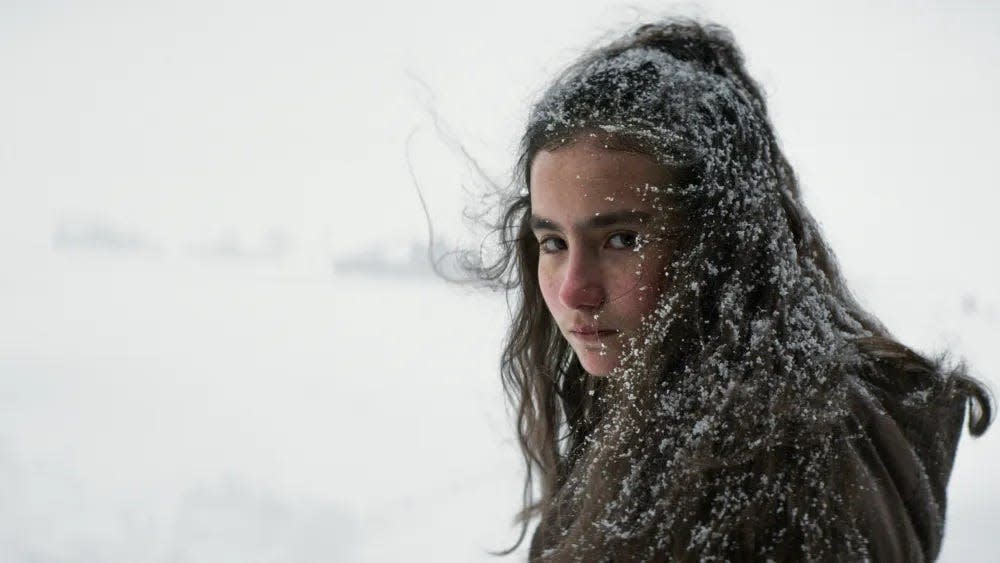Ragtag flick 'About Dry Grasses' calls viewers to see, savor life

- Oops!Something went wrong.Please try again later.
Perhaps spending over three hours with a dour, embittered character in a remote area of Turkey doesn’t sound like your idea of a fun time at the movies. But then you would miss Nuri Bilge Ceylan’s “About Dry Grasses,” which is both a thoughtful and compelling cinematic experience.
Despite the cramped spaces it occupies, I would call it an existential epic that is as much about your life experiences as those who are on the screen.
Samet (Deniz Celiloğlu) is a tough guy to like. Originally from Istanbul, he is assigned a teaching gig in rural Anatolia. I don’t know much about Turkey, but the winter landscape initially presented looks bleak, unforgiving, lonely.
It is a farming community, and Samet barely disguises feeling that his pupils are all a bunch of rubes-in-waiting. From the moment he opens his mouth, Samet proclaims his desire to leave when a transfer is available. Who can blame him? I could feel the misery of the place in my bones.
He is an art teacher and also a wonderful photographer with a real knack for capturing not only grand vistas but human faces. Whether he is good in a classroom, the evidence is doubtful. Again, his disdain influences his work.
Samet takes a preference to young Sevim (Ece Bağcı), in whom he sees potential beyond her surroundings. But he and his roommate/fellow teacher Kenan (Musab Ekici) are soon accused of being inappropriate with certain students, including Sevim.
Samet responses with anger and resentment to his star pupil even though she must be going through many complicated emotions. Never mind, as selfishness seems to be the teacher’s only motivation.
While this school drama emerges, Samet meets another fellow teacher, Nuray (Merve Dizdar). Initially uninterested, he plays matchmaker between her and Kenan. Samet claims her politics are “too left” as an example of his disinterest. One has to wonder if he’s also nonplussed by Nuray’s injury. She is an amputee, having lost her leg by being too close to a suicide bomber.
This is the most overt political messaging of “About Dry Grasses,” which otherwise depicts the oppressive Turkish government with barely-seen bureaucrats and barely-examined accusations.
As the film moves along, and after Kenan expresses clear interest with this new woman in their lives, Samet begins to sing a different tune. His overtures towards Nuray feel not so much rooted in actual affection but in being disruptive towards his friend. Samet’s intentions would feel like a betrayal if he didn’t seem so outwardly self-loathing.
Which is the central thesis of “About Dry Grasses.” This is a story about a man wishing for a life rather than living in the life he currently has. A teacher, a friend and lover who has chosen to bury his humanity rather than embrace what is around him.
Maybe life has dealt Samet some bad hands — who can say they've had a perfect run? The film is about his awakening from this slumber of gloomy sadness, and about how achieving what he wants might make him realize that his ability to see the world as it is was available to him all along. The question remains whether it is too late.
That makes the film challenging, especially given the slow-burning character development over the film’s long running time. The audience is challenged in enduring this lousy — but relatable — character in hopes there is a cathartic payoff at the end. It is not clear whether Samet has learned much by the final frame.
Although he gains an awareness by thinking of how the dry grass emerging from the winter’s snow allows him to climb up the steep mountain towards a higher plane. Everyone in the audience can relate to feeling as though the world should be better or that a better life might be happening somewhere on top of that hill. But savoring the experience and seeing where it takes you might be more fulfilling.
Where “About Dry Grasses” works best is making us aware of this in our own lives rather than making us feel for the experience of the characters on screen; this is the real trick and one the film pulls off well.
Challenging, but worthwhile. The performances are top-notch, and the directing is carefully calibrated to build upon densely complicated characters. Plus, I felt like the rural world portrayed had real dimensions to it. Given my agrarian upbringing, it very much made me think of time spent looking through small-town windows and dreaming of … something else.
It also made me sad I often do not have much access to Turkish cinema and I wonder what other gems audiences here in the Midwest have missed.
“About Dry Grasses” begins its run at Ragtag Cinema this Friday. Usually these long foreign flicks have a short shelf life, so I would urge you to check it out as soon as you get the chance.
James Owen is the Tribune’s film columnist. In real life, he is a lawyer and executive director of energy policy group Renew Missouri. A graduate of Drury University and the University of Kansas, he created Filmsnobs.com, where he co-hosts a podcast. He enjoyed an extended stint as an on-air film critic for KY3, the NBC affiliate in Springfield, and now regularly guests on Columbia radio station KFRU.
This article originally appeared on Columbia Daily Tribune: Ragtag flick 'About Dry Grasses' calls viewers to see, savor life

